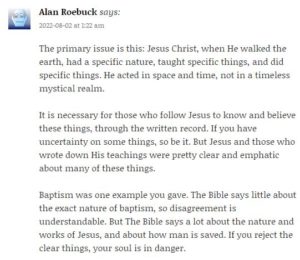
To the mystical Christian, conversion is what happens when one opens up their divine (heart) sense—with or without the assistance of the other five senses—to the Holy Spirit.[1][7] This belief—which solely leads to salvation—is an act of will alone, involving no outwardly visible action.[2][6a] Salvation is not based on one’s works.[3]
The impetus of change comes directly from the Spirit towards the person receiving it. It is received or accepted. The result—as shown in the book of James—is an outpouring of the fruit of the Spirit.[4] The closer one is in communion with the Spirit, the more fruit they will produce.

Doctrine—obedience to God’s Will—comes from the Spirit, not Spirit from the doctrine. If one were to be in full communion with God—as Jesus was—there could be no doctrinal error. Clarity in the former produces clarity in the latter, not the converse. The Father revealed the nature of Jesus to Simon Peter and so was he saved.[5] He brought nothing to the table. Indeed, his stubborn self made him the very last of the eleven to come to faith.
To say that not following doctrines puts your soul in danger is equivalent to saying that you are saved by your deeds. It is to reject the notion that salvation stems from faith and communion with the Spirit in one’s divine sense: the heart.[6] No, one cannot lose one’s soul because one does not obey the proper doctrine. Rather, a heart-led Christian will follow God’s will as a direct result of one’s internal state.
A Christian is someone who confesses with their mouth what is in their heart: that they are a sinner who repents, that they believe that Jesus was resurrected, and that Jesus is their Lord. Those are the requirements. Doctrinal purity is not a requirement for conversion (and thus salvation).
NOTES
[1] Matthew 13:14-15: “In them is fulfilled the prophecy of Isaiah: “‘You will be ever hearing but never understanding; you will be ever seeing but never perceiving. For this people’s heart has become calloused; they hardly hear with their ears, and they have closed their eyes. Otherwise they might see with their eyes, hear with their ears, understand with their hearts and turn, and I would heal them.’”
[2] John 3:16: “For God so loved the world that he gave his one and only Son, that whoever believes in him shall not perish but have eternal life.”
[3] Ephesians 2:8-9: “For it is by grace you have been saved through faith, and this not from yourselves; it is the gift of God, not by works, so that no one can boast.”
[4] Galatians 5:22-23: “But the fruit of the Spirit is love, joy, peace, forbearance, kindness, goodness, faithfulness, gentleness and self-control. Against such things there is no law.”
[5] Matthew 16:17: “And Jesus answered and said unto him, Blessed art thou, Simon Bar-jona: for flesh and blood hath not revealed it unto thee, but my Father which is in heaven.”
[6] Romans 10:9: “If you declare with your mouth, “Jesus is Lord,” and believe in your heart that God raised him from the dead, you will be saved.”
[a] A spoken confession of faith is required, but is not itself the means of salvation, which is belief.[2]
[7] It is possible to use all the senses—in combination with logic and reason—to push one towards conversion, but it is not those senses that produce salvation or allow access to the divine. They are merely an aid.

Pingback: The Advent of Christian Mysticism | Σ Frame
Derek, what does this mean ” when one opens up their divine heart sense” ? Jeremiah and Ezekiel says God takes out the heart of stone and puts in a heart of flesh and God puts his laws on our heart forgives our sins stc. We simply receive what the Spirit is doing in us. Agree? But we don’t open our heart God does. Hope you’re well.
Kevin,
Did God harden Pharaoh’s heart (Exodus 4:21; 9:12; etc.) or did Pharaoh harden his own heart (Exodus 8:15,32; 9:34)? Well, it is both.
Jesus said he stands at the door and knocks. Anyone who hears and opens the door will let him in. It is to the latter that I refer to when I say “when one opens up their divine heart sense”.
One important consequence of this is that whenever Jesus isn’t knocking, you cannot open the door to him. When he knocks, it is important to listen and respond, for he may not knock again for a long time (see: Nebuchadnezzar living as a wild man). But when he does knock, you have a choice to respond.
Once you receive the Holy Spirit, you must culture your spiritual sense if you wish to fully commune with the Spirit. This is why the Anabaptists emphasized separation from evil and godly, disciplined elders in the Schleitheim Confession. A heart corrupted by the world is one in which the Spirit has less power.